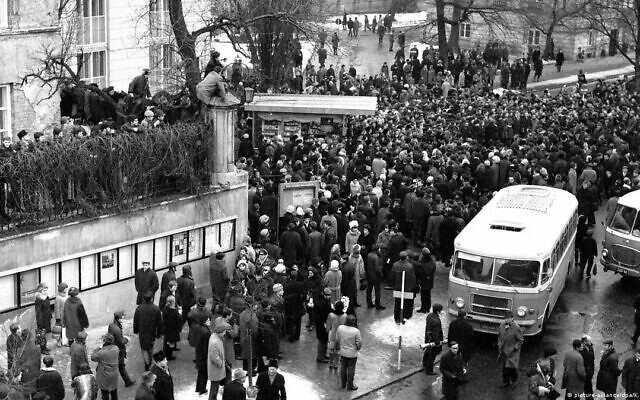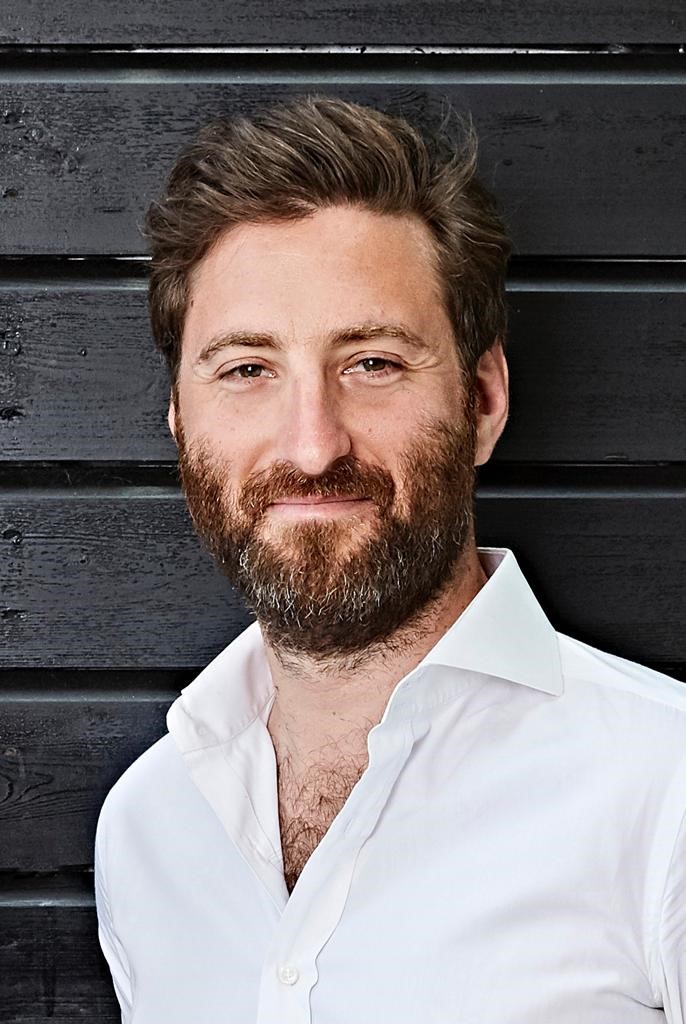OPINION: Forgotten exodus – When the Jews left Poland
Daniel Korski writes in order to learn what being Jewish means, we must confront the legacy of expulsion head-on

Jews are known for their acute sense of history, especially as it concerns our own people’s experiences. But most Jews today are unfamiliar with the last European antisemitic campaign, which targeted Jews. It took place 23 years after the Holocaust, 55 years ago today, when an internal power struggle inside the Polish Communist party spilled into an antisemitic purge, what writer Henryk Grynberg called a “dry pogrom”.
Thousands of members of the country’s intelligentsia, including outstanding Jewish scientists, artists and writers – alongside ordinary people – were thrown out of their jobs and eventually expelled from the country. The ostensible reason had been the Jews’ support for Israel in the Six Days War, a war that had seen the communist bloc’s Arab allies defeated by Israel. The campaign, equated Jewish origins with “Zionism” and disloyalty to a Socialist Poland.
My mothers family were among those expelled. Moshe and Ita Wajntraub weren’t prominent in any way. They weren’t members of the Communist party. Modest, hard-working people, they observed some Jewish occasions but were not particularly religious.

My grandfather had been put up for adoption as his parents died from typhoid fever. My grandmother and her nine siblings lived in the Jewish quarter in Warsaw; her mother made wigs for the city’s religious women.
As Nazi Germany and the Soviet Union divided Poland in 1939, my grandparents fled as far eastwards as they could make it and survived the war in Uzbekistan. Coming back to Poland when the war ended my grandparents settled in a small industrial town in western Poland.
Family lore has it that my grandmother was so exhausted from the months of travel back from Uzbekistan, probably in cattle carts, that she told my grandfather “I don’t care where we are, we are getting off.” So my mother was born and lived her early years in the small town of Choinow close to Wrocław. They were one of the few Jewish families in the village.
The family spoke Yiddish and celebrated the high seasons and my grandfather kept the monthly Jewish magazine but they didn’t keep Shabbat. “I always knew we had to keep a low profile about our Jewishness”, says my mother.
A hardworking and quiet man, my grandfather became the town factory’s book-keeper. He was respected by his colleagues, a source of calm and pragmatism in a difficult period as Poland rebuilt itself from the destruction of World War. My grandmother helped organise the factory’s social events. Farmers would give my grandmother vegetables for free, my mother recalls. The family was well-liked. The world of high politics, party machinations and global intrigue were far away from their village lives.
One of the most troubling aspects of the expulsion was the complicity of Polish society in the government’s actions.
To my grandparents, the events following the Six Days War were therefore especially shocking. For the second time in their lives, much as my paternal grandparents had to, they were targeted simply for being Jewish. Stripped of their rights, citizenship and forced to seek a new life elsewhere. My mother had just embarked on her studies to become a midwife and her brother was working as an engineer, having recently graduated.
My grandfather’s standing at work meant that his colleagues built our family a crate with which to transport their belongings. This act of collegiate kindness shows that many ordinary Poles did not support the expulsions. To my grandfather’s colleagues, he was one of them – a friend and a colleague. When I went back to Choinow with my mother in 2003 the continued poignancy of the events in the 1960s was brought home to me. A woman recognised my mother on the streets and burst out crying, begging my mother to forgive her for not having done more to protect her and her family. She had been a family acquaintance.
One of the most troubling aspects of the expulsion was the complicity of Polish society in the government’s actions. Not everyone supported the expulsions – my grandfather’s colleagues stand out. Like during World War II when many ordinary Poles hid and helped fleeing Jews, the same took place in the late 1960s. Too many Jews overlook this. But many Poles were either indifferent to the antisemitic campaign, felt that they couldn’t do anything or actively participated in the discrimination. And this is a difficult truth for many Poles to face, even today.
A woman recognised my mother on the streets and burst out crying, begging my mother to forgive her for not having done more to protect her and her family. She had been a family acquaintance.
Many Poles struggle to confront this painful chapter in their country’s history. There is a tendency to want to portray Poland as a victim – because it has truly been a victim many times in history – rather than also a perpetrator. Acknowledging the role that some Poles played in the expulsion goes against that narrative.
Better to argue the expulsions were the fault of the Soviets, that Poland was occupied or that the events were all because of the behaviour of high-ranking Jews in the Communist regime, a reckoning for whom simply spilled over into wider society.
But if Poland wants to truly reckon with its history and build a better future for all of its citizens, it should confront the legacy of the expulsion head-on. This means not only acknowledging the harm that was done but also working to repair the damage caused.
President Duda took important and welcome steps in this direction in 2018 when he publicly asked those expelled for forgiveness. Talking about the events of 1968, he said: “What a shame, what a loss for the Polish Republic today that those who left – and some who are maybe dead because of 1968 – are not here with us today… I am so sorry.”
My family had in fact already received an apology. When I told a previous Polish leader, President Komorowski, on a visit to Poland about my family’s history he made me extend a personal apology to my mother and to invite her to come back. The Polish government has also made it easier for Jews who were expelled to reclaim their citizenship.
But there is still more to do to tell the story of the expulsion. To help spread knowledge of the events following the Six Days War, together with my friends Daniel Schatz, Philip Boyes, Rene Rechtman and I – all children of expelled Jews – are launching an archive to collect the testimonies of those Jews that were expelled. The end of more than 700 years of Jewish Polish history deserves further attention and a central repository of testimonies.
My mother settled first in Sweden and then in Denmark. She built a great life for herself and for me, fighting hard not to let the events of the late 1960 tar her. Many expelled Jews did the same. But the pain of the expulsion was always present. A reminder that, as my grandfather experienced, however diligent you work, however well-liked you are in your community, however assimilated you are, you can always be reduced to just being Jewish.
- Daniel Korski is a former special adviser to Prime Minister David Cameron and the co-founder and CEO of PUBLIC, a venture capitalist firm focused on helping technology startups transform public services

Thank you for helping to make Jewish News the leading source of news and opinion for the UK Jewish community. Today we're asking for your invaluable help to continue putting our community first in everything we do.
For as little as £5 a month you can help sustain the vital work we do in celebrating and standing up for Jewish life in Britain.
Jewish News holds our community together and keeps us connected. Like a synagogue, it’s where people turn to feel part of something bigger. It also proudly shows the rest of Britain the vibrancy and rich culture of modern Jewish life.
You can make a quick and easy one-off or monthly contribution of £5, £10, £20 or any other sum you’re comfortable with.
100% of your donation will help us continue celebrating our community, in all its dynamic diversity...
Engaging
Being a community platform means so much more than producing a newspaper and website. One of our proudest roles is media partnering with our invaluable charities to amplify the outstanding work they do to help us all.
Celebrating
There’s no shortage of oys in the world but Jewish News takes every opportunity to celebrate the joys too, through projects like Night of Heroes, 40 Under 40 and other compelling countdowns that make the community kvell with pride.
Pioneering
In the first collaboration between media outlets from different faiths, Jewish News worked with British Muslim TV and Church Times to produce a list of young activists leading the way on interfaith understanding.
Campaigning
Royal Mail issued a stamp honouring Holocaust hero Sir Nicholas Winton after a Jewish News campaign attracted more than 100,000 backers. Jewish Newsalso produces special editions of the paper highlighting pressing issues including mental health and Holocaust remembrance.
Easy access
In an age when news is readily accessible, Jewish News provides high-quality content free online and offline, removing any financial barriers to connecting people.
Voice of our community to wider society
The Jewish News team regularly appears on TV, radio and on the pages of the national press to comment on stories about the Jewish community. Easy access to the paper on the streets of London also means Jewish News provides an invaluable window into the community for the country at large.
We hope you agree all this is worth preserving.





















